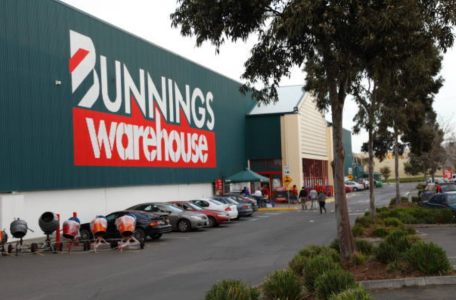Big employers treat workers like numbers in shocking new move
By
Gian T
- Replies 0
If you’ve ever felt like just another cog in the machine when applying for a job, you’re not alone—and it seems things are only getting more impersonal.
In a move that’s raising eyebrows across the country, some of Australia’s biggest employers—including Bunnings, Woolworths, Qantas, David Jones, Suncorp, and Starbucks—are now using artificial intelligence (AI) to screen job applicants.
The goal is to make hiring more 'efficient, inclusive, and effective.' But is it really a step forward, or are we losing the human touch?
Let’s set the scene: you’re excited about a new job opportunity at your local Bunnings or Woolworths.
Instead of chatting with a friendly recruiter, you’re greeted by a chatbot and asked to record video responses to a set of questions.
This is all powered by Sapia AI, a Melbourne-based company that promises to streamline the hiring process for both employers and job seekers.
According to Bunnings, the AI interview is 'comparable to a traditional phone interview,' but with a few modern twists.
You can take your time, edit your answers, and complete the process at your own pace—usually in about 30 minutes.
And if you don’t have the right technology, Bunnings says they’ll arrange an alternative format for you.
The company insists that this approach is fair and impartial, focusing solely on your answers to a standard set of questions.
Sapia, the AI provider, claims their system saves companies up to 20 hours a week in recruitment time and cuts the time-to-hire in half.
They even report a 90 per cent satisfaction rate among applicants.
Not everyone is convinced. Tammie Ballis, a seasoned recruiter and owner of Realistic Careers, isn’t buying the hype.
She calls the process 'dehumanising,' arguing that it reduces applicants to mere numbers in a database.
'It’s a cost-cutting feature, it’s also a screening tool,' she said. 'You are treated like a number now more than ever, especially if you are applying to jobs for the big retailers.'
Her advice is, if you want a more personal experience, try applying to small or medium-sized businesses, where you’re more likely to interact with a real person.
Social media users have also weighed in, with many expressing frustration and concern.
One Reddit user summed it up: 'If they were interested in hiring you, they’d speak to you in person. Don’t put up with this dehumanising c***.'
Others worry that soon, people will be selling 'optimal answers' for AI interviews, much like search engine optimisation (SEO) for Google.
Bunnings’ chief people officer, Damian Zahra, says the company still relies on the 'expertise' of its internal recruitment team.
The AI interview is just one step in the process, and real people review all applications before any in-person interviews take place.
For those who aren’t comfortable with online applications, Bunnings offers the option to contact their talent team directly by phone or through a local store.
Sapia AI, for its part, rejects the idea that its technology dehumanises recruitment.
A spokesperson argues that traditional hiring is already full of bias and inefficiency, often reducing people to their CV or postcode. 'Our AI-led, chat-based interview is designed to give every candidate a fair go, in their own words and on their own time.
No face-to-face bias. No ghosting. And everyone gets meaningful feedback—something that rarely happens in hiring.'
There’s no denying that technology has changed the way we live and work—sometimes for the better, sometimes not.
For older Australians, the shift to online and AI-driven processes can be especially daunting. Not everyone is comfortable with video interviews or chatbots, and there’s a real risk that some people could be left behind.
On the other hand, AI can help level the playing field by removing unconscious bias and making the process more transparent.
It can also speed things up, which is a blessing for anyone who’s ever waited weeks to hear back about a job application.
But at what cost? Are we sacrificing the personal touch that makes work meaningful? Are we missing out on great candidates who just aren’t tech-savvy?
 Have you applied for a job recently and encountered an AI-powered interview? Did you find it fair, or did it feel a bit too robotic for your liking? Do you think technology is making things better or worse for job seekers, especially for those of us over 60? Share your thoughts and experiences in the comments below.
Have you applied for a job recently and encountered an AI-powered interview? Did you find it fair, or did it feel a bit too robotic for your liking? Do you think technology is making things better or worse for job seekers, especially for those of us over 60? Share your thoughts and experiences in the comments below.
Read more: Shocking truth about secret use of AI radio host for hip-hop show
In a move that’s raising eyebrows across the country, some of Australia’s biggest employers—including Bunnings, Woolworths, Qantas, David Jones, Suncorp, and Starbucks—are now using artificial intelligence (AI) to screen job applicants.
The goal is to make hiring more 'efficient, inclusive, and effective.' But is it really a step forward, or are we losing the human touch?
Let’s set the scene: you’re excited about a new job opportunity at your local Bunnings or Woolworths.
Instead of chatting with a friendly recruiter, you’re greeted by a chatbot and asked to record video responses to a set of questions.
This is all powered by Sapia AI, a Melbourne-based company that promises to streamline the hiring process for both employers and job seekers.
According to Bunnings, the AI interview is 'comparable to a traditional phone interview,' but with a few modern twists.
You can take your time, edit your answers, and complete the process at your own pace—usually in about 30 minutes.
And if you don’t have the right technology, Bunnings says they’ll arrange an alternative format for you.
The company insists that this approach is fair and impartial, focusing solely on your answers to a standard set of questions.
Sapia, the AI provider, claims their system saves companies up to 20 hours a week in recruitment time and cuts the time-to-hire in half.
They even report a 90 per cent satisfaction rate among applicants.
Not everyone is convinced. Tammie Ballis, a seasoned recruiter and owner of Realistic Careers, isn’t buying the hype.
She calls the process 'dehumanising,' arguing that it reduces applicants to mere numbers in a database.
'It’s a cost-cutting feature, it’s also a screening tool,' she said. 'You are treated like a number now more than ever, especially if you are applying to jobs for the big retailers.'
Her advice is, if you want a more personal experience, try applying to small or medium-sized businesses, where you’re more likely to interact with a real person.
Social media users have also weighed in, with many expressing frustration and concern.
One Reddit user summed it up: 'If they were interested in hiring you, they’d speak to you in person. Don’t put up with this dehumanising c***.'
Others worry that soon, people will be selling 'optimal answers' for AI interviews, much like search engine optimisation (SEO) for Google.
Bunnings’ chief people officer, Damian Zahra, says the company still relies on the 'expertise' of its internal recruitment team.
The AI interview is just one step in the process, and real people review all applications before any in-person interviews take place.
Sapia AI, for its part, rejects the idea that its technology dehumanises recruitment.
A spokesperson argues that traditional hiring is already full of bias and inefficiency, often reducing people to their CV or postcode. 'Our AI-led, chat-based interview is designed to give every candidate a fair go, in their own words and on their own time.
No face-to-face bias. No ghosting. And everyone gets meaningful feedback—something that rarely happens in hiring.'
There’s no denying that technology has changed the way we live and work—sometimes for the better, sometimes not.
For older Australians, the shift to online and AI-driven processes can be especially daunting. Not everyone is comfortable with video interviews or chatbots, and there’s a real risk that some people could be left behind.
It can also speed things up, which is a blessing for anyone who’s ever waited weeks to hear back about a job application.
But at what cost? Are we sacrificing the personal touch that makes work meaningful? Are we missing out on great candidates who just aren’t tech-savvy?
Key Takeaways
- Major Australian employers like Bunnings and Woolworths have been criticised for using artificial intelligence in their hiring processes, with some calling it 'dehumanising' and saying applicants are treated like a number.
- The Sapia AI tool used by these companies automates the initial interview stage, allowing candidates to answer questions online at their own pace, but some job seekers and recruiters prefer more personal, human interactions.
- Critics argue that automated recruitment can be impersonal and may favour those who know how to use the right keywords, while supporters claim the technology makes hiring fairer and more efficient.
- Bunnings and Sapia AI both maintain that all candidates are treated fairly and have options for support, with final hiring decisions still reviewed by human staff and in-person interviews conducted for suitable applicants.
Read more: Shocking truth about secret use of AI radio host for hip-hop show








